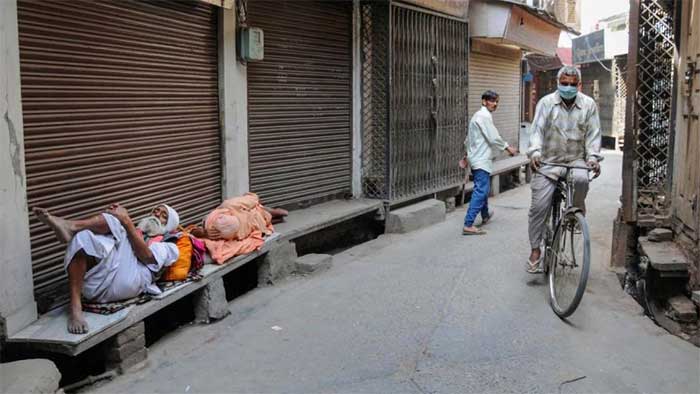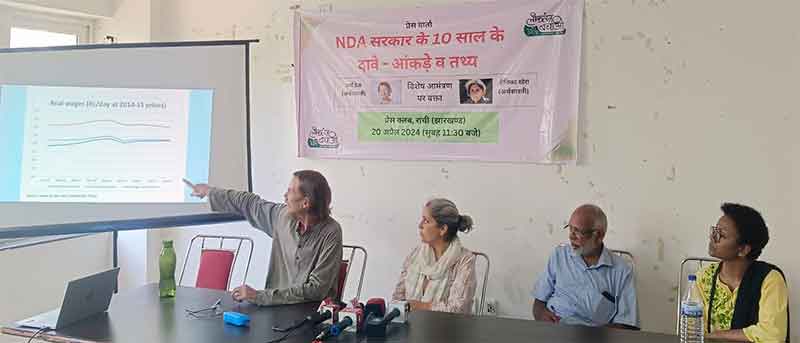
There is no choice between saving lives and protecting livelihood. The State has to strike a balance between them. The lockdown exit programme should be a balancing act between the lives and livelihood.
Every sector of our country has come to a screeching halt. The sudden announcement of the lockdown generated panic in the minds of all the citizens more particularly migrant workers, casual workers, badli workers etc.
Lockdown was inevitable but the State has to take into consideration the livelihood of the citizens affected by such sudden lockdowns and adverse effect on the economy expeditiously.
The central government has taken certain measures to mitigate the financial hardship being faced by the employees of various establishments by invoking Disaster Management Act, 2005. The government has issued an order dated 29.3.2020 directing all the employers, be it in the industry or in the shops and commercial establishments, shall make payment of wages of their workers, and their workplaces, on the due date, without any deduction, for the period their establishment are under closure during the lockdown. The question whether such a direction can be issued or not within the framework of the Disaster Management Act, 2005 has already been questioned before the Hon’ble Supreme Court.
The State has to realise the fact that the entire nation has come to a standstill and unless and until certain economic measures beneficial to all sectors more particularly the small and medium enterprises the economy cannot be put back on the track.
The policy should be beneficial to both to the employer and employee. The employer cannot be forced to incur heavy financial burden to pay the wages more than what they are statutorily liable to pay to their employees. Though the government of India has invoked the provisions of Disaster Management Act, 2005, to direct all the employers irrespective of nature of business to pay full wages to the workers / employees during the lockdown period, it is doubtful as to whether such a power is conferred by the said Act. The obligation to rehabilitate the effected person is on the State but not on private entity. Therefore the said aspect of payment of wages should be left open to the respective employers within the framework of the respective legislations.
For instance the Industrial Disputes Act contemplates respective rights inter-se between the employer and the workmen. Sec.2(kkk) of the said Act defines ‘layoff’ means the failure, refusal or inability of an employer on account of the shortage of power, accumulation of stocks or breakdown of machinery or natural calamity or for any other unconnected reason to give employment to the workmen whose name is borne on the muster rolls of the Industrial establishment. All the workers whose names are reflected in the muster rolls are within the ambit of said definition. They are entitled for compensation under Sec.25C of the Act i.e., 50% of their wages during the lockdown period. But those workers who are badli or casual are not entitled for such compensation. In such cases the State has to direct the respective industries to furnish particulars with regard to the said workmen and provide necessary financial relief. Such relief would be within the frame work of the Disaster Management Act, 2005. But the State cannot direct all kind of employers to pay full wages to the workmen during the lockdown period irrespective of the nature of their employment.
In case if the employers are forced to comply with the said directions, some of them may face huge financial burden and may not be recover economically and ultimatelyboth of them would be affected.
The Reserve Bank of India though has issued certain directions to all the banks with regard to payment of loan instalments during the lockdown period, the same may not be helpful in the larger context.
We have been experiencing the mechanical action of the banks in invoking the provisions under the SARFAESI Act 2002 against the borrowers who have defaulted in payment of merely three consequent instalments on the ground that the account has been classified as non-performing asset, without exploring the genuine reason for non-payments and trying to revise the accounts.
Unless SARFAESI Act, 2002 is suitably amended taking into account the lockdown period, there is every possibility that the banks may take harsh measures against the borrowers whose accounts might have slipped into the adverse classification.
‘Bank’ is also a State within the meaning of Article 12 of the Constitution. Therefore the banks have to re-devise their guidelines in relation to providing working capital and other financial assistance to the borrowers to revive the units and be able to pay the wages to the employees. Unless the bank aids the borrowers in particular areas it is very difficult to restore the normal business activity.
In such situations there is an obligation on the State to take suitable measures to protect the livelihood of the citizens. Right to life under Article 21 of the constitution is not confined to right to live but includes right of livelihood. Unless there is work, there cannot be livelihood.
The Hon’ble Supreme Court also held in Olga Tellis and others Vs. Bombay Municipal Corporation and others held that right to live and right to work are integrated and interdependent and therefore if a person is deprived of the job, his very right to life is put in jeopardy.
The Hon’ble Supreme Court had specifically held that the constitution is not only the paramount law of the land but it is the source and substance of all laws. Its provisions are conceived in public interest and are intended to serve a public purpose. The right to life conferred by Article 21 is wide and far reaching.
The Hon’ble Supreme court also held that an equally important facet of that right is the right to livelihood because; no person can live without the means of living, i.e., the means of livelihood. Article 39(a) of the constitution, which is a directive principle of State policy, provides that the State shall, in particular, directs its policy towards securing that the citizens, men and women equally, have the right to an adequate means of livelihood.
Article 41 directs the State to make effective provisions for securing the right to work. The Hon’ble Supreme Court emphasises that the said principles contained in Article 39(a) and Article 41 must be regarded as equally fundamental in the understanding and the interpretation of the meaning and content of fundamental right. The State cannot deprive the right to livelihood to the citizen.
The Indian constitution mandates that the State shall endeavour to protect the means of livelihood of a citizen. The State has to take affirmative action in the light of the said constitutional obligation. A comprehensive programme to kick-start the economy has to be devised as soon as possible in a expeditious manner. The government has to raise above the narrow political consideration and induct specialist in economic and health fields in their advisory board irrespective of the political ideology of the said specialists. It is time to shut off our narrow political outlook and come together to revive the nation and the State is constitutionally obligated to achieve the same.
Chittarvu Raghu, Advocate, High Court’s of A.P. & T.S. Email: [email protected]
SIGN UP FOR COUNTERCURRENTS DAILY NEWS LETTER











































